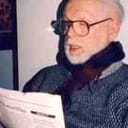Stay in the Loop
BSR publishes on a weekly schedule, with an email newsletter every Wednesday and Thursday morning. There’s no paywall, and subscribing is always free.
The global future of literature, or: Why can't humanists be more humane?
Literature's global future

What began in my mind as a panic over the sudden decline in English majors has morphed into dissatisfaction with what we academics think and do under the rubric "Humanism."
When I began graduate studies in 1949, C.P. Snow was waging his one-man rebellion known as the "Two Cultures" controversy. As a radar technician in the Navy, I had earned a new respect for industrial technology that my Catholic upbringing ignored completely. So though I was eager to become a professional humanist, I grew increasingly skeptical over the evident narrow-mindedness of many of my humanist professors (except for Mortimer Kadish's lectures on logical positivism, which erased completely in one semester my Thomist training).
Indeed, my interdisciplinary Ph.D. in American culture demanded a broader definition of the humanities. I learned that this "new specialty" derived from Harvard's celebration of its tercentenary in 1936. American lit was a many-faceted reality: Theology in the 17th Century, Politics in the 18th, and no belles lettres until the mid-19th. So my five "fields" were Am Lit (beginnings to the Civil War, Civil War to the present); American philosophy and its European antecedents, American economic history; and American art and architecture.
Whitman's mausoleum
So what's next? As a teacher, I added Afro-American literature first, then Appalachian lit and, in he "'60s, African lit. I was gradually working my way toward a concept I called "International English."
In London the summer of 1978, I took the $150,000 my father left me the previous year and started the Centre for Internationalizing English. It engaged in feats like renewing Walt Whitman's crumbling mausoleum in Camden and celebrating Emily Dickinson's 150th birthday in 1980 with a glorious arts festival, during which we faithfully read all 1,775 of her poems, night and day. My filmmaking son Michael took over the floundering foundation when I abandoned teaching in 1982 for free-lancing worldwide.
Ethiopians in Washington
Which brings me to my latest discovery: the Ethiopian journalist Dinaw Mengestu's glorious first novel, The Beautiful Things That Heaven Bears (the title quotes Dante emerging from Hell). Mengestu wrote it while researching a piece for Rolling Stone on Darfur. Its hero, Sepha Stephanus, fled from Ethiopia after his father was abused by the Reds who took over his country. Mengestu himself actually left that beleaguered land at the age of two in 1980, with his mother and sister. Went to Georgetown, took an M.F.A. in fiction and started freelancing abroad.
The Beautiful Things centers on a trio (an engineer, a waiter, and the hero) who have left different African countries and deal with their loneliness by meeting at the hero's grocery store in a black rundown section of Washington, D.C. They play a parlor game they've invented to dull their pains of isolation, in which one cites an obscure African dictator and his pals must name the country and the date of his takeover.
Judith, an American political history professor separated from her African husband, moves in next door with her biracial teen Naomi, and an off-and-on relationship never matures, try as they awfully awkwardly do. Meanwhile, white gentry start remodeling the rundown neighborhood houses, to which the poor American blacks respond by mounting a terrorist campaign to run the new rich out.
A slot next to Amy Tan
Here we have a new subgenre of International English: Africans interacting with white and black Americans. As it is, there is no dearth of Asian fiction in America and abroad: Think of Amy Tan. Nor is there any shortage of white and black Africans commenting on lives in Africa: Think Nadine Gordimer and Chinua Achebe. So Mengestu alerts us to a new slot in International English. The way he weaves writers as diverse as Emily Dickinson and Tocqueville into his narratives of isolation and conflict is astonishing.
Alas, Mengestu, tapped out psychically by his Darfur assignment, has moved with his wife and son to Paris— where, I'm sure, we'll eventually learn how he relates to Europeans, a talent we Americans could cultivate.
Louis Kahn's vow
Which brings me to my conviction: American humanism must be future-oriented. We must think of humanism as a vade mecum for globalization. When Thomas Friedman writes in the New York Times about telephone start-ups in India that allow the poor to send money home or to bank it, we are talking humanism. Whatever makes people more ethical and independent is humanistic.
So a university cancels a French department? Or English Ph.D.'s? The issue is not majors. The issue is what facilitates our understanding of the the complexities of the future we all face. Much of that needed knowledge is science-based. Humanists must vow as the architect Louis Kahn did in his library for the Salk Center for Biological Sciences in California: He made it so that humanists and scientists must mingle!
Degentrifying Logan Circle
The future International English curriculum will be as much science as art. No humanism without the two, fused! Past-oriented humanistic study may give the "well-educated" a sense of superiority to the underclasses. But the only legitimate humanism, I submit, is not about glorying over the past. It's about making the future genuinely humane for everyone. The rest is mere snobbery.
Mengestu saw that so clearly in his describing how the superficially humanistic went about dealing with gentrifying the Logan Circle neighborhood in D.C. Whatever honors man's greatest gift— his reason, disciplined— is humanism. Otherwise, it's mere gentrification.
When I began graduate studies in 1949, C.P. Snow was waging his one-man rebellion known as the "Two Cultures" controversy. As a radar technician in the Navy, I had earned a new respect for industrial technology that my Catholic upbringing ignored completely. So though I was eager to become a professional humanist, I grew increasingly skeptical over the evident narrow-mindedness of many of my humanist professors (except for Mortimer Kadish's lectures on logical positivism, which erased completely in one semester my Thomist training).
Indeed, my interdisciplinary Ph.D. in American culture demanded a broader definition of the humanities. I learned that this "new specialty" derived from Harvard's celebration of its tercentenary in 1936. American lit was a many-faceted reality: Theology in the 17th Century, Politics in the 18th, and no belles lettres until the mid-19th. So my five "fields" were Am Lit (beginnings to the Civil War, Civil War to the present); American philosophy and its European antecedents, American economic history; and American art and architecture.
Whitman's mausoleum
So what's next? As a teacher, I added Afro-American literature first, then Appalachian lit and, in he "'60s, African lit. I was gradually working my way toward a concept I called "International English."
In London the summer of 1978, I took the $150,000 my father left me the previous year and started the Centre for Internationalizing English. It engaged in feats like renewing Walt Whitman's crumbling mausoleum in Camden and celebrating Emily Dickinson's 150th birthday in 1980 with a glorious arts festival, during which we faithfully read all 1,775 of her poems, night and day. My filmmaking son Michael took over the floundering foundation when I abandoned teaching in 1982 for free-lancing worldwide.
Ethiopians in Washington
Which brings me to my latest discovery: the Ethiopian journalist Dinaw Mengestu's glorious first novel, The Beautiful Things That Heaven Bears (the title quotes Dante emerging from Hell). Mengestu wrote it while researching a piece for Rolling Stone on Darfur. Its hero, Sepha Stephanus, fled from Ethiopia after his father was abused by the Reds who took over his country. Mengestu himself actually left that beleaguered land at the age of two in 1980, with his mother and sister. Went to Georgetown, took an M.F.A. in fiction and started freelancing abroad.
The Beautiful Things centers on a trio (an engineer, a waiter, and the hero) who have left different African countries and deal with their loneliness by meeting at the hero's grocery store in a black rundown section of Washington, D.C. They play a parlor game they've invented to dull their pains of isolation, in which one cites an obscure African dictator and his pals must name the country and the date of his takeover.
Judith, an American political history professor separated from her African husband, moves in next door with her biracial teen Naomi, and an off-and-on relationship never matures, try as they awfully awkwardly do. Meanwhile, white gentry start remodeling the rundown neighborhood houses, to which the poor American blacks respond by mounting a terrorist campaign to run the new rich out.
A slot next to Amy Tan
Here we have a new subgenre of International English: Africans interacting with white and black Americans. As it is, there is no dearth of Asian fiction in America and abroad: Think of Amy Tan. Nor is there any shortage of white and black Africans commenting on lives in Africa: Think Nadine Gordimer and Chinua Achebe. So Mengestu alerts us to a new slot in International English. The way he weaves writers as diverse as Emily Dickinson and Tocqueville into his narratives of isolation and conflict is astonishing.
Alas, Mengestu, tapped out psychically by his Darfur assignment, has moved with his wife and son to Paris— where, I'm sure, we'll eventually learn how he relates to Europeans, a talent we Americans could cultivate.
Louis Kahn's vow
Which brings me to my conviction: American humanism must be future-oriented. We must think of humanism as a vade mecum for globalization. When Thomas Friedman writes in the New York Times about telephone start-ups in India that allow the poor to send money home or to bank it, we are talking humanism. Whatever makes people more ethical and independent is humanistic.
So a university cancels a French department? Or English Ph.D.'s? The issue is not majors. The issue is what facilitates our understanding of the the complexities of the future we all face. Much of that needed knowledge is science-based. Humanists must vow as the architect Louis Kahn did in his library for the Salk Center for Biological Sciences in California: He made it so that humanists and scientists must mingle!
Degentrifying Logan Circle
The future International English curriculum will be as much science as art. No humanism without the two, fused! Past-oriented humanistic study may give the "well-educated" a sense of superiority to the underclasses. But the only legitimate humanism, I submit, is not about glorying over the past. It's about making the future genuinely humane for everyone. The rest is mere snobbery.
Mengestu saw that so clearly in his describing how the superficially humanistic went about dealing with gentrifying the Logan Circle neighborhood in D.C. Whatever honors man's greatest gift— his reason, disciplined— is humanism. Otherwise, it's mere gentrification.
What, When, Where
The Beautiful Things That Heaven Bears. By Dinaw Mengestu. Riverhead Press, 2007. 240 pages; $22.95. www.amazon.com.
Sign up for our newsletter
All of the week's new articles, all in one place. Sign up for the free weekly BSR newsletters, and don't miss a conversation.

 Patrick D. Hazard
Patrick D. Hazard